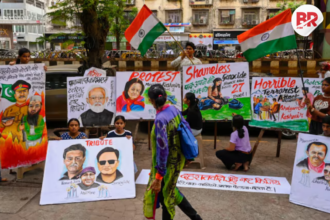
India-Pakistan Relations at a Precipice: Understanding the Pahalgam Fallout
The already volatile relationship between India and Pakistan has hit a new low after the tragic Pahalgam terror attack on April 22nd. With 26 innocent lives lost, the attack has sparked a dangerous escalation that threatens to push the two nations to the brink of an even deeper conflict.
The Pahalgam Attack: A Spark Igniting Old Fires
The Pahalgam attack is a grim reminder of the enduring threat of terrorism that looms over the region. While India has unequivocally condemned the attack, pointing fingers at Pakistan-based terror groups, Pakistan’s reaction has been predictably evasive.

In a desperate attempt to distance itself from responsibility, Pakistan has denied any involvement, but the evidence is overwhelming. The terrorists behind the attack have long-standing links to Pakistan, making their denials as hollow as ever.
Also Read Pahalgam Attack: Demolishing Terrorists’ Homes Is Just the Beginning – Government Strikes Back
India’s Retaliatory Measures: A Show of Strength
In response to the attack, India has taken strong, decisive actions that send a clear message to Pakistan. These are not mere symbolic gestures; they are calculated moves designed to protect India’s sovereignty and demonstrate zero tolerance for terrorism.
Suspension of the Indus Waters Treaty: The suspension of this vital water-sharing agreement is perhaps the boldest move India has made. The treaty, which has been in place for decades, has been a cornerstone of stability between the two nations.
Suspending it now not only threatens the water security of Pakistan but could also impact downstream countries like Bangladesh. This decision is a testament to India’s readiness to push back when provoked. One wonders how Pakistan will cope when the flow of water becomes more limited.
Cancellation of Visas for Pakistanis: The government has also suspended visas for Pakistani nationals, effectively cutting off people-to-people ties.
This may seem like a small step, but it has a far-reaching impact. Families are separated, businesses are strained, and the cultural exchanges that once helped bridge divides are now at risk. This feels like the final nail in the coffin for any hope of reconciliation.
These actions clearly show that India will no longer tolerate Pakistan’s role in fostering terrorism. The Indus Waters Treaty suspension is a bold move with potentially massive consequences—one that Pakistan may regret.
Pakistan’s Response: Tit-for-Tat Escalation
Unsurprisingly, Pakistan has reacted in the usual manner, with threats and further escalation. Pakistan’s response has included:
Suspension of the Simla Agreement: This historic agreement, which laid the groundwork for peaceful bilateral relations post-1971 war, has now been abandoned by Pakistan.
By suspending it, Pakistan has shown its willingness to disregard decades of diplomatic effort, leaving no room for future dialogue. It’s clear that Pakistan is no longer interested in peace but rather in stoking tensions at every opportunity.
Closing Airspace to Indian Flights: This move is a childish retaliation aimed at inconveniencing Indian travelers and hurting India’s trade relations.
By closing its airspace, Pakistan is willing to sacrifice the well-being of its own people for the sake of petty politics. In the end, it’s the people who suffer the most, as this move will increase travel times and costs, all for the sake of saving face.
Also Read Pakistan Shells Line of Control, India Responds: Escalating Tensions
Where Do We Go From Here? Navigating a Precarious Path
The current situation is nothing short of perilous. The tit-for-tat escalation between the two nations is dangerously close to spiraling out of control.
At this juncture, both countries need to exercise restraint. The need for dialogue is more pressing than ever, but with Pakistan’s blatant disregard for peace, it seems that hope for reconciliation is fading fast.
India must continue to maintain its tough stance, but it is also crucial to keep avenues open for diplomacy. International intervention may be needed to push Pakistan back to the negotiating table. But let’s face it, given Pakistan’s recent behavior, that may be wishful thinking.
For now, India remains resolute, hoping for a peaceful resolution, but prepared for all outcomes. War is never the answer, but peace will be impossible if Pakistan continues to ignore the roots of terrorism in its soil.
Also Read The Pahalgam Attack Wasn’t Random—It Was Ideology in Action. Is Pakistan Accountable?












